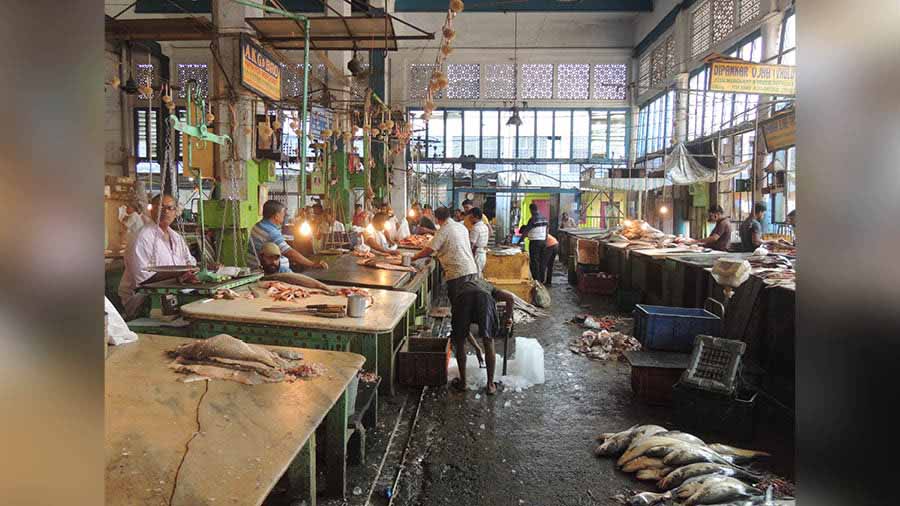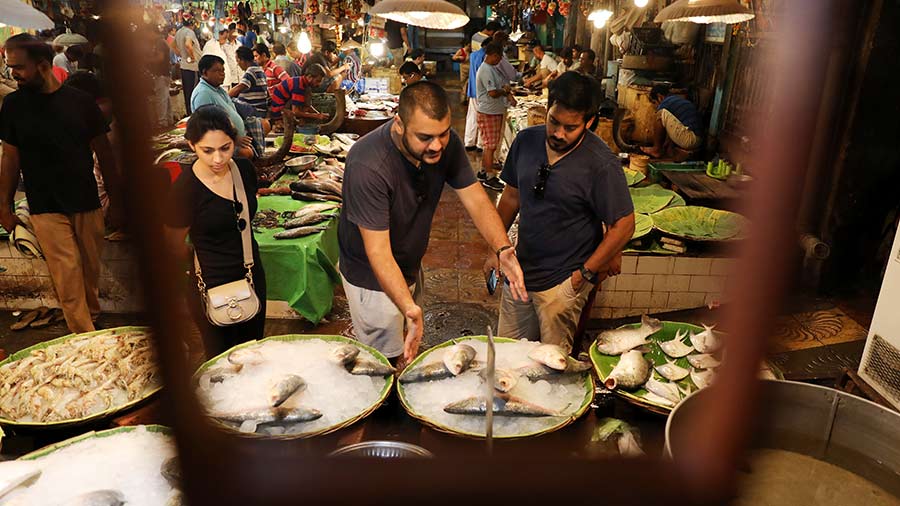Bengalis have had a special place for fish in their hearts and palates for centuries, and the bond seems to only grow stronger every passing year. From the delectable fish fry to golden fried jumbo prawns, fish dishes never fail to whet palates of Bengalis across the city and there’s a good chance that the ingredients for the tasty morsel came from Sir Stuart Hogg Market’s fish range, more popularly the New Market fish range. Fish is sold all over Kolkata, but among the iconic fish markets in the city, New Market reigns supreme. Among the 30-odd establishments currently in business at New Market, the name of B.C. Ojha and their business of fish commands centre stage.
It was in 1934 that B.C. Ojha set up his first stall in the market and within a very short time, he added seven more stalls to the business. Occupying about 50 sq ft of area each, these stalls remain largely unchanged complete with the same wooden storage trunks that can stock close to 1,000 kilos of fish. Samir Kumar Ojha took over the reins in the years since and the business continued to flourish commanding acclaim from all corners of the country. Today, the next generation of the family has taken charge of different sections of the business. Shivaji Ojha is in charge of the sales on the New Market premises.
However, not all is well at the market, where the conditions are now precarious and unhygienic. In a conversation with My Kolkata, Shivaji Ojha shares his knowledge about the conditions and also the future prospects of the market.
Deteriorating conditions
Things were a lot better even 20 years ago and the infrastructure was not as it is today, says Ojha. “Among the many problems we face is the obvious fact that customers face extreme difficulty in coming to the market and then in parking their vehicles. Secondly, the fish market as you see it today, has become a very unhygienic place. Sadly, it is undoubtedly one of the filthiest markets where such extreme volumes of products are dealt with on a regular basis.” There is no system in place to wash the market and things have taken a turn for the worse since the pandemic, he adds. “It will shock many to know that ever since the days of the pandemic, this market complex has not gone through a hard wash — something it obviously requires.”
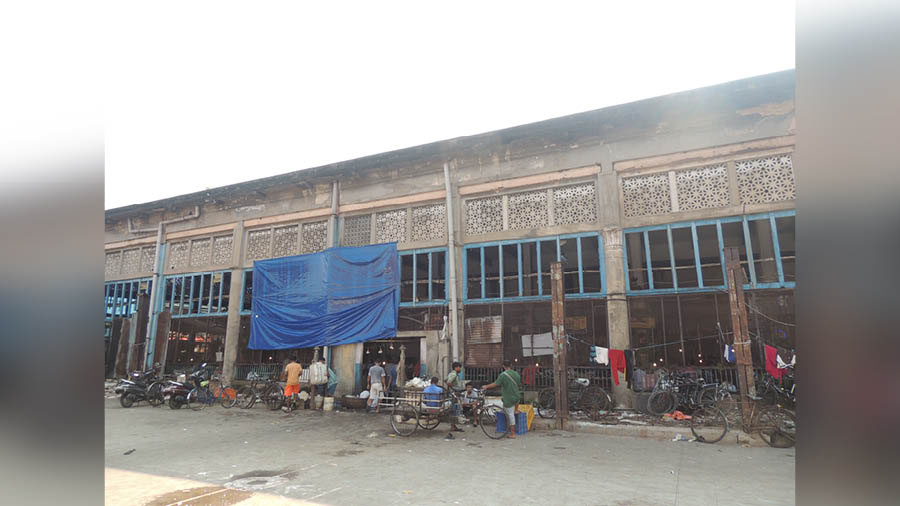
Not only do buyers find it difficult to access the market and find parking, the sellers operate under unhygienic conditions
They procure water on their own account from far away and try to wash the surroundings “as best as we can”, he continues. “What makes it more horrendous is the fact that the entire drainage system has collapsed and no water from the market is able to drain into the sewerage systems. There is no system of supplying water to the market and the one and only borewell we had now lies in a non-working condition. The sweepers deputed by the corporation do a cursory act of cleaning and are gone in no time.” They take away the garbage that the shop owners leave out every day, but do not clean the premises with water — a regular practice even ten years back, but something that has become obsolete after the pandemic, says Ojha. “We have been told that the underground sewer line is completely bust and the water has stopped draining completely. We do bring in sweepers, but all they can do is clean the pits which get clogged again in no time.”
Speaking on measures taken, Ojha elaborates that complaints have been made but without results. “We have, time and again, complained to the corporation, we have on many occasions conveyed the sorry state of affairs to the market superintendent, and we have submitted written appeals to the market manager who is stationed in the corporation office but nothing has yielded even an iota of positive results. We have also verbally conveyed our problems to the authorities many times but to no avail.” The authorities do not visit the market, he adds. “It will come as a surprise to know that the superintendent never ever pays a visit to the market. The story is the same with the market manager, and other officers deputed to the market leave from the gate itself without ever bothering to step inside.”
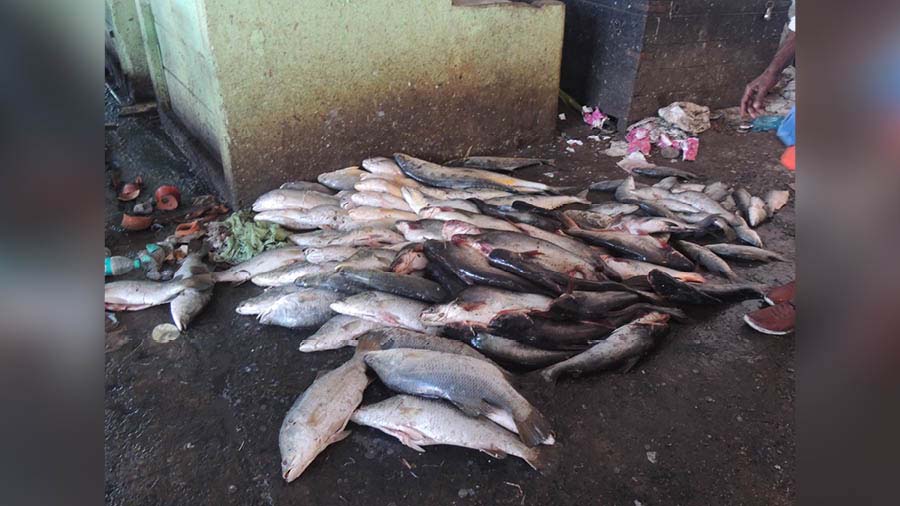
Fresh produce brought in the morning are left on the dirty ground of the market
Neglected heritage
The situation seems unbelievable since the market is well-known not only in the city, but also well-known to most major similar establishments in the country. The fish market of New Market has heritage, and credit must be given to its British planners as many of the things they incorporated into the design still enables sellers to conduct their business today. One of the features is the high ceiling with open demarcations, which allows the passage of fresh air and uninterrupted ventilation. The high ceilings, lack of brick walls, extensive use of openings in windows and the jafris or decorative cement partitions have all contributed towards the air staying fresh, which helps the fish range survive in the midst of such unhygienic circumstances.
All the stall owners vouch that every individual conducting business on the premises pays all their governmental dues well on time but when it comes to the authorities doing their bit, there is only apathy and indifference. Time and again the corporation makes its presence felt by sending out information on the need to adopt practices that are hygienic, scientific and for the good of the people and the consumers, but the work ends there and no official follows up with a physical visit.
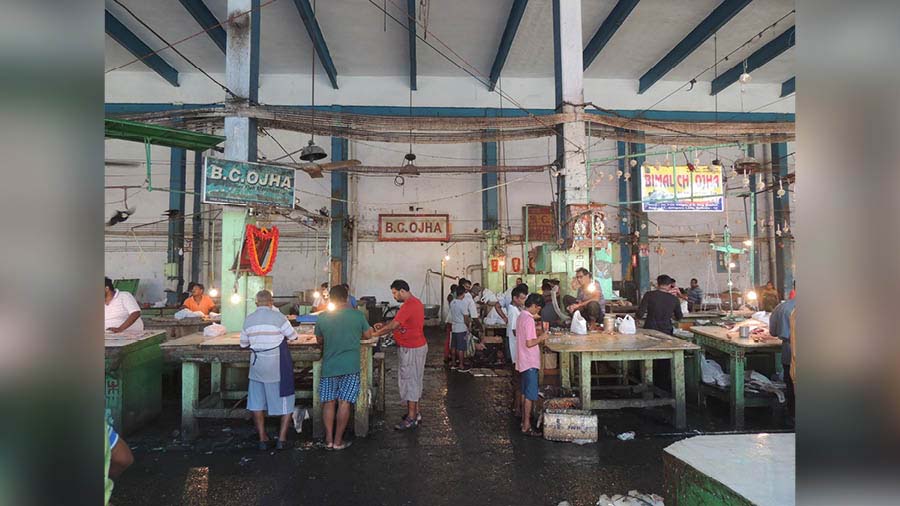
The infrastructure at the market has remained largely unchanged since the time of the its inception
The sellers all complain about the unhealthy, even ghastly, ways that they have to dump the fishes that arrive at the market. It is obvious that the underground drainage system has to be worked on immediately otherwise no healthy practices can be adopted inside the market.
Voicing their disdain at the corporation and the way it's official have been working they say, “How long can we be doing this on our own? It’s such a travesty that all of this is happening at a stone’s throw distance from the corporation office itself. The mayor of the corporation would take less than three minutes on foot to reach us, the other officials are situated even closer and in spite of such close proximity we are being forced to work in such inhospitable conditions.” They add that the charges for maintenance and rent for the stalls are collected without any laxity, however the same is not true when it comes to providing basic facilities to the sellers. “We try our level best to abide by all their instructions, but it’s sad that all that we get in return is complete indifference and neglect. The shame is far greater for the corporation, as this pitiable and sorry state of affairs is allowed to sustain right under their noses.”
The sellers understand that in an organic market like theirs, like in any other such market, the lack of hygiene and cleanliness can lead to the spread of diseases. However, even that fact has not prompted any positive action, they say adding that fixing the drainage system and the installation of a water supply system would remove the major obstacle to their operations enabling each of them to make the fish range at Hogg Market even greater.
“To add to our woes, the corporation does not allow us to make essential repairs without their consent and permission. Had this not been the case, we could have taken personal efforts to make things better. Some renovation and repair work was carried out in the past and thanks to that rain water does not accumulate on the roof and the roof is a lot better. If only the work at the ground level had also been done, things would have been so much better.”
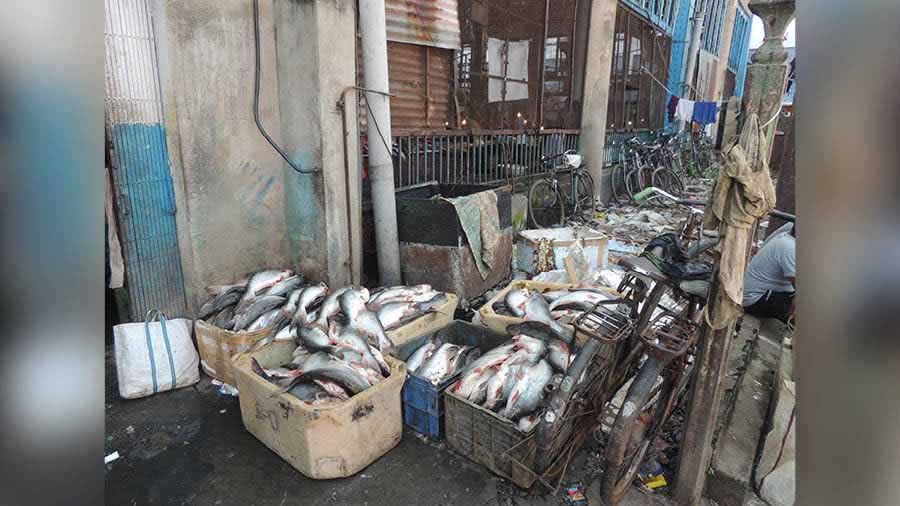
Fish are stocked in unhygienic conditions at the gate
The business of the fish market
Elaborating on the business operations at the market, Ojha says, “Almost two tonnes of fish are handled here every day and this figure increases substantially during wedding season and festive times such as Durga Puja, Christmas, New Year, etc. Fishes of every variety are brought in from all over India and each region of India is famous for a certain variety.” Bekti, for instance, easily the most popular in the market, comes from the southern states from the places adjoining the Bay of Bengal such as Odisha and Andhra Pradesh as well as from the Sunderbans area, he adds. Local fishes come from Basirhat, Hasnabad, from wholesalers in Howrah and Sealdah and different fishing centres in the Midnapores, Canning and Diamond Harbour as well as many other places. A number of varieties of fish also come from Andhra Pradesh, Chennai, Gujarat and Mumbai.
“It’s a matter of pride that prawns — for which Bengal is regarded as the den — are available in ample supply from the market. The taste of the prawn from Bengal is easily the most palatable and it beats the competition from other states hands down. The prawns, namely tiger prawns, scampi prawns are always available in whatever quantity that customers may want. Apart from this many other popular varieties of fish are also available from the market here.” The market opens at around 6.30am every day and work finishes by 1.30pm. “Ours is a one-shift market and only in times of high demand we keep the market open in the evenings but for a very short period of time,” Ojha explained.
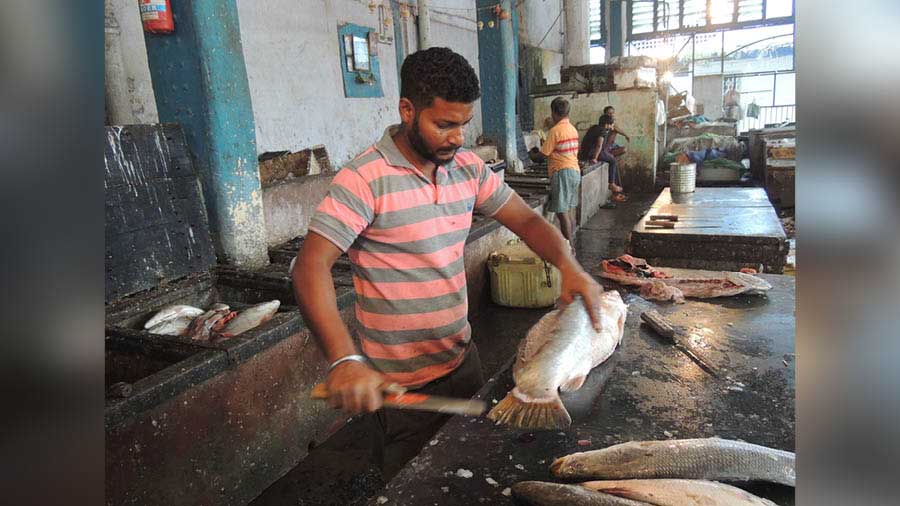
Bekti is one of the most popular fishes sold at the market
Sharing his years of experience in the business, Ojha explained about the most popular fishes sold at the market. “A little knowledge on Bekti becomes essential at this point. We are compelled to have all the different varieties of Bekti. The best boneless fillets that are used for most hotel dishes comes from our own Indian Bekti. Next on the list is the Indian Rock Salmon which is different from the Norwegian Rock Salmon. These two are on the top of the list and naturally the prices for the two are among the highest. The next variety we stock is the Bombay Bekti and then comes the Bhola Bekti. Also on the list are Haddock, the Hamours, Silver Snapper, White Snapper and Red Snapper.” Customers purchase according to their capabilities and wishes and the sellers feel compelled to stock all the varieties as the price for Bekti has increased substantially and gone beyond the reach of many. “From my experience, I can say that natural Bekti is on the verge of extinction and whatever little may be available is always sold at a premium price,” says Ojha. They usually procure the farmed variety of the fish and it’s only a few establishments in the city that continue to insist on the best variety. On most occasions they fail to deliver their full requirement as that premium variety is not always available, he adds.
There was a time when fishes used to come in from Bangladesh but in recent times, prices for the same have increased substantially in the country itself and Bangladeshi dealers find it more fruitful to sell in their markets namely in Dhaka. Dealers from the south of India are more ingenious in their ways of doing business and they first inquire about prevailing prices in Kolkata markets and only send the produce when the prices are suitable for them. Most sellers agree that the varieties and yield of fishes from Bengal have gone down drastically. Added to this problem is the fact that fishes from Odisha too are being sent to Bangalore and as result the volume of business has taken a beating of late.
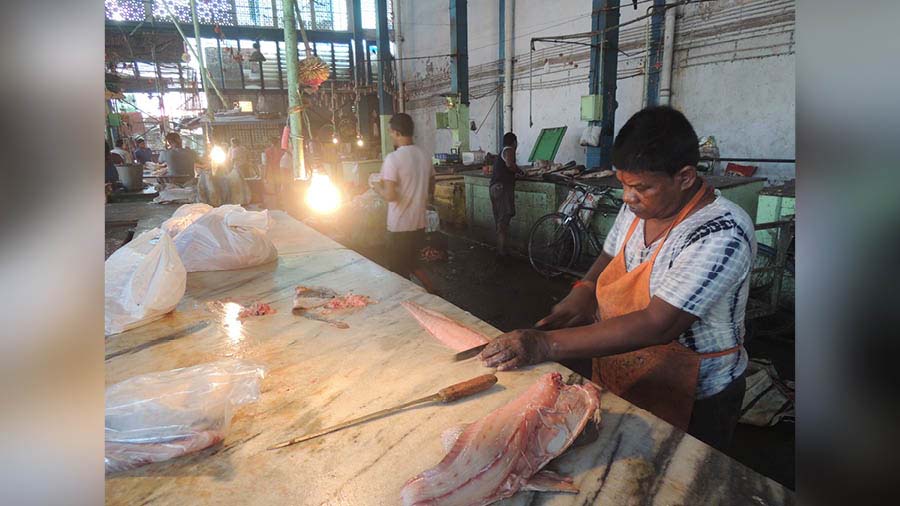
Bekti fillets being prepared
For the love of fish
The Bengali ethos will never be complete in a world devoid of their favourite fishes and it’s that thought that drives Ojha and his fellow businessmen to continue their trade with unquestionable interest every day. What hurts is the fact that the state government and the city corporation inexplicably refuse to pay heed to the rectifications that need to be executed with immediate effect.


